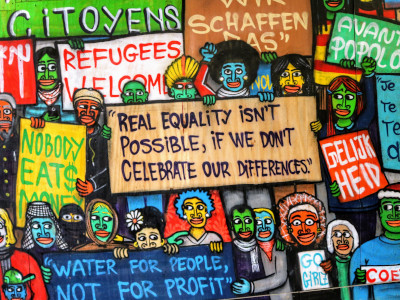Social Innovation

Research Institute for Social Innovation
Public governance, welfare and social innovation
Addressing social exclusion, discrimination and various forms of inequalities is a crucial challenge for the future of Europe and its citizens. The understanding of rapidly changing multicultural and multilingual societies requires a cross-disciplinary approach, spanning across the social sciences and humanities, and including law and ICT, to address issues such as gender equity and diversity, access to education, accessibility and disability rights, health and social welfare, labour markets, active ageing, demographic change, family and children protection, consumer protection, and sustainable company law.
Research on these themes benefits from innovative tools such as social innovation, a trans-disciplinary concept increasingly applied to a range of fields with the ultimate goal of removing barriers to participation in society, reducing inequalities, and promoting integration, inclusion and justice and healthcare by means of well designed public policies.
Keywords
Accessibility for inclusion, Active ageing and demographic change, Active citizenship, Agent-based models, Behavioural economics, Collective identities, Decision sciences, Education policy, Gender equality, Health economics, Inclusion and fairness, Inequalities, Integration, Intercultural relations, Long term care, Policy evaluation, Protection of rights, Smart cities and communities, Social innovation, Translation studies, Transnational history, User-driven innovation, Well-being
Coordinator
Research facilitators
Fulvio Grassadonio
Elena Grandi
Members
High-impact and award-winning projects
SHARE-COVID19: Non-intended health, economic and social effects of the COVID-19 epidemic control decisions
The non-intended consequences of the epidemic control decisions to contain the COVID-19 pandemic are huge and affect the well-being of European citizens in terms of economics, social relationships and health. The overarching objective of this project is to understand these non-intended consequences and to devise improved health, economic and social policies. In our policy recommendations, we strive to make healthcare systems and societies in the EU more resilient to pandemics in terms of prevention, protection and treatment of the population 50+, a most vulnerable part of the population. The project’s team represents medicine, public health, economics and sociology and has worked together since the creation of SHARE. It is experienced in translating data analysis into concrete policy advice. The project’s policy recommendation is targeted at policy makers in the Commission and in national ministries as well as at national and international NGOs and social organisations.
Website
Researcher: Agar Brugiavini
Duration: 01/11/2020 - 30/10/2023
MIMOSA - MarItime and MultimOdal Sustainable pAssenger transport solutions and services
MIMOSA is focused on changing a low level of cross-border connectivity by developing visible outputs, ranging from multimodal solutions to innovative and smart tools and technologies. It tackles the common challenge of increasing multimodality and reducing the impact of transport on the environment.
Website
Researcher: Andrea Stocchetti
Duration: 01/05/2020 - 31/12/2022
UR_Beira: reinforcing emergency helthcare services in Beira district
The project aims at strengthening emergency health services managed by local authorities in the district of Beira (Portugal), with a focus on obstetric and paediatric emergencies, through the adoption of a centralised emergency management model endorsed by the district and national authorities. Thus shall contribute to the reduction of mortality and morbidity related to medical emergencies.Target Groups: 30 staff part of the Serviço Distrital de Saúde, Mulher e Acção Social di Beira (health district authority), the management 4 team of Central Hospital of Beira and the personnel of the Serviço de Emergência Medica em Moçambique (Medical Emergency Service in Mozambique), that will benefit from the improvement of capacities of management of emergencies and referral system; 270 healthcare staff including: personnel of the healthcare facilities of Beira (Hospital and Health Centres), paramedic personnel and the staff of the emergency central line; 12.000 residents in the city of Beira that are estimated to need first medical aid and referral, around 5.000 pregnant women and 3.000 children under five who are expected to access quality emergency and obstetric care without any delay.
Researcher: Andrea Stocchetti
Duration: 13/01/2020 - 13/01/2023
POW-BRIDGE - Bridging the gap between legislation and practice in the Posting of Workers
POW-BRIDGE studied the gap between procedures (legal basis) and practices (experiences) in posting rule enactment, identified challenges, developed and shared effective ways of addressing these challenges for posting companies and implementation agencies. It particularly investigated how the Directive interplays with other EU and national legislation in terms of social security, health insurance, temporary agency work, and company law. The geographical scope of the action included: Austria, Slovenia, Italy, Slovakia, Hungary, Poland, Serbia, and North Macedonia.
Website
Researcher: Fabio Perocco
Duration: 01/01/2020 - 31/12/2021
Cohesion in further developing and innovating SHARE across all 28 member countries
The population ageing issue represents a key challenge in the EU since it affects ageing-related policies such as those for pensions, healthcare and long-term health reforms. The EU-funded SHARE-COHESION project is a research infrastructure that aims to better understand the challenges of the ageing process in the EU Member States. The main purpose of the project is to collect excellent data combining transdisciplinary, longitudinally and strict cross-national comparability that can be used for research. The results will allow a cross-national comparison of the social, health and economic status of EU citizens over 50 years of age and permit a comparative estimation of ageing-related policies that will support development and innovation programmes.
Website
Researcher: Agar Brugiavini
Duration: 01/10/2019 - 30/09/2023
SSHOC - Social Sciences & Humanities Open Cloud
Social Sciences & Humanities Open Cloud (SSHOC) is a project funded by the EU framework programme Horizon 2020 and unites 20 partner organisations and their 27 associates in developing the social sciences and humanities area of the European Open Science Cloud (EOSC). During the 40-month lifespan of the project, SSHOC will transform the current social sciences & humanities data landscape with its disciplinary silos and separate facilities into an integrated, cloud-based network of interconnected data infrastructures.
Project website / EU Cordis database
Researcher: Agar Brugiavini
Duration: 01/01/2019 - 30/04/2022
Funding: Horizon 2020
SIforREF – Social policies for refugees integration
The challenge that SIforREF addresses is combating the risk of marginalization of refugees after the reception phases, which are different in each country, through the design and implementation of social innovation methodologies. The project aims to facilitate refugees’ autonomy by enhancing or launching refugee integration policies at regional and local level (countries involved: Italy, Germany, Austria and Slovenia). To achieve this objective, refugee integration should be included in the decisional agenda both at local and transnational level and policy-makers should adopt inclusive measures in governance. The complexity of this issue requires a mutual learning among central European regions, especially neighbourhood regions like those involved in the project.
Website
Researcher: Francesca Campomori
Duration: 01/01/2019 - 31/12/2021
ECOS4IN ‐ Cross‐border Ecosystem for Industry 4.0
The 4th industrial revolution is inevitable and will affect all industrial sectors. The impacts of Industry 4.0 depend on readiness of regions to respond, accept and adopt the changes. Our model supports the sustainable cooperation of actors of innovation systems to strengthen and prepare the regional innovation capacities in CE area for such changes. ECOS4IN project connected the partners from CE countries that have specific idea about expected impacts of Industry 4.0 implementation and wants to involve the entities from other regions dealing with similar problems. There is a strong common intention of partners to find new creative ways how to use the opportunities of Industry 4.0 and other technologies called "advanced manufacturing systems" while eliminating the risks. The project has contributed to improving regional innovation capacity by creating a suitable environment for the implementation of Industry 4.0.
Website
Researcher: Vladi Finotto
Duration: 01/01/2019 - 31/12/2021
Con 3 Post: Mapping the Trend in the Construction Sector
Con3Post ("Posting of Third Country Nationals: Mapping the Trend in the Construction Sector") explores a persistent and under-researched trend of recruiting and posting of third-country nationals to work in the construction sector within the single European labour market. It seeks to produce new knowledge on the phenomenon, encourage transnational cooperation and exchange of information between key stakeholders in the EU and third countries, and increase access to information.
Website
Researcher: Fabio Perocco
Duration: 01/01/2019 - 31/12/2020









